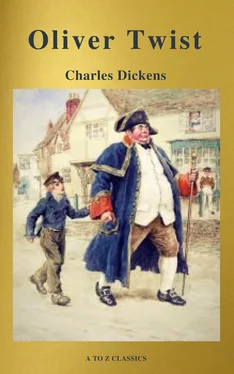‘Weal pie,’ said Mr. Weller, soliloquising, as he arranged the eatables on the grass. ‘Wery good thing is weal pie, when you know the lady as made it, and is quite sure it ain’t kittens; and arter all though, where’s the odds, when they’re so like weal that the wery piemen themselves don’t know the difference?’
‘Don’t they, Sam?’ said Mr. Pickwick.
‘Not they, sir,’ replied Mr. Weller, touching his hat. ‘I lodged in the same house vith a pieman once, sir, and a wery nice man he was—reg’lar clever chap, too—make pies out o’ anything, he could. “What a number o’ cats you keep, Mr. Brooks,” says I, when I’d got intimate with him. “Ah,” says he, “I do—a good many,” says he, “You must be wery fond o’ cats,” says I. “Other people is,” says he, a–winkin’ at me; “they ain’t in season till the winter though,” says he. “Not in season!” says I. “No,” says he, “fruits is in, cats is out.” “Why, what do you mean?” says I. “Mean!” says he. “That I’ll never be a party to the combination o’ the butchers, to keep up the price o’ meat,” says he. “Mr. Weller,” says he, a–squeezing my hand wery hard, and vispering in my ear—“don’t mention this here agin—but it’s the seasonin’ as does it. They’re all made o’ them noble animals,” says he, a–pointin’ to a wery nice little tabby kitten, “and I seasons ’em for beefsteak, weal or kidney, ‘cording to the demand. And more than that,” says he, “I can make a weal a beef–steak, or a beef–steak a kidney, or any one on ’em a mutton, at a minute’s notice, just as the market changes, and appetites wary!”’
‘He must have been a very ingenious young man, that, Sam,’ said Mr. Pickwick, with a slight shudder.
‘Just was, sir,’ replied Mr. Weller, continuing his occupation of emptying the basket, ‘and the pies was beautiful. Tongue—, well that’s a wery good thing when it ain’t a woman’s. Bread—knuckle o’ ham, reg’lar picter—cold beef in slices, wery good. What’s in them stone jars, young touch–and–go?’
‘Beer in this one,’ replied the boy, taking from his shoulder a couple of large stone bottles, fastened together by a leathern strap—‘cold punch in t’other.’
‘And a wery good notion of a lunch it is, take it altogether,’ said Mr. Weller, surveying his arrangement of the repast with great satisfaction. ‘Now, gen’l’m’n, “fall on,” as the English said to the French when they fixed bagginets.’
It needed no second invitation to induce the party to yield full justice to the meal; and as little pressing did it require to induce Mr. Weller, the long gamekeeper, and the two boys, to station themselves on the grass, at a little distance, and do good execution upon a decent proportion of the viands. An old oak afforded a pleasant shelter to the group, and a rich prospect of arable and meadow land, intersected with luxuriant hedges, and richly ornamented with wood, lay spread out before them.
‘This is delightful—thoroughly delightful!’ said Mr. Pickwick; the skin of whose expressive countenance was rapidly peeling off, with exposure to the sun.
‘So it is—so it is, old fellow,’ replied Wardle. ‘Come; a glass of punch!’
‘With great pleasure,’ said Mr. Pickwick; the satisfaction of whose countenance, after drinking it, bore testimony to the sincerity of the reply.
‘Good,’ said Mr. Pickwick, smacking his lips. ‘Very good. I’ll take another. Cool; very cool. Come, gentlemen,’ continued Mr. Pickwick, still retaining his hold upon the jar, ‘a toast. Our friends at Dingley Dell.’
The toast was drunk with loud acclamations.
‘I’ll tell you what I shall do, to get up my shooting again,’ said Mr. Winkle, who was eating bread and ham with a pocket–knife. ‘I’ll put a stuffed partridge on the top of a post, and practise at it, beginning at a short distance, and lengthening it by degrees. I understand it’s capital practice.’
‘I know a gen’l’man, Sir,’ said Mr. Weller, ‘as did that, and begun at two yards; but he never tried it on agin; for he blowed the bird right clean away at the first fire, and nobody ever seed a feather on him arterwards.’
‘Sam,’ said Mr. Pickwick.
‘Sir,’ replied Mr. Weller.
‘Have the goodness to reserve your anecdotes till they are called for.’
‘Cert’nly, sir.’
Here Mr. Weller winked the eye which was not concealed by the beer–can he was raising to his lips, with such exquisite facetiousness, that the two boys went into spontaneous convulsions, and even the long man condescended to smile.
‘Well, that certainly is most capital cold punch,’ said Mr. Pickwick, looking earnestly at the stone bottle; ‘and the day is extremely warm, and—Tupman, my dear friend, a glass of punch?’
‘With the greatest delight,’ replied Mr. Tupman; and having drank that glass, Mr. Pickwick took another, just to see whether there was any orange peel in the punch, because orange peel always disagreed with him; and finding that there was not, Mr. Pickwick took another glass to the health of their absent friend, and then felt himself imperatively called upon to propose another in honour of the punch–compounder, unknown.
This constant succession of glasses produced considerable effect upon Mr. Pickwick; his countenance beamed with the most sunny smiles, laughter played around his lips, and good–humoured merriment twinkled in his eye. Yielding by degrees to the influence of the exciting liquid, rendered more so by the heat, Mr. Pickwick expressed a strong desire to recollect a song which he had heard in his infancy, and the attempt proving abortive, sought to stimulate his memory with more glasses of punch, which appeared to have quite a contrary effect; for, from forgetting the words of the song, he began to forget how to articulate any words at all; and finally, after rising to his legs to address the company in an eloquent speech, he fell into the barrow, and fast asleep, simultaneously.
The basket having been repacked, and it being found perfectly impossible to awaken Mr. Pickwick from his torpor, some discussion took place whether it would be better for Mr. Weller to wheel his master back again, or to leave him where he was, until they should all be ready to return. The latter course was at length decided on; and as the further expedition was not to exceed an hour’s duration, and as Mr. Weller begged very hard to be one of the party, it was determined to leave Mr. Pickwick asleep in the barrow, and to call for him on their return. So away they went, leaving Mr. Pickwick snoring most comfortably in the shade.
That Mr. Pickwick would have continued to snore in the shade until his friends came back, or, in default thereof, until the shades of evening had fallen on the landscape, there appears no reasonable cause to doubt; always supposing that he had been suffered to remain there in peace. But he was not suffered to remain there in peace. And this was what prevented him.
Captain Boldwig was a little fierce man in a stiff black neckerchief and blue surtout, who, when he did condescend to walk about his property, did it in company with a thick rattan stick with a brass ferrule, and a gardener and sub–gardener with meek faces, to whom (the gardeners, not the stick) Captain Boldwig gave his orders with all due grandeur and ferocity; for Captain Boldwig’s wife’s sister had married a marquis, and the captain’s house was a villa, and his land ‘grounds,’ and it was all very high, and mighty, and great.
Mr. Pickwick had not been asleep half an hour when little Captain Boldwig, followed by the two gardeners, came striding along as fast as his size and importance would let him; and when he came near the oak tree, Captain Boldwig paused and drew a long breath, and looked at the prospect as if he thought the prospect ought to be highly gratified at having him to take notice of it; and then he struck the ground emphatically with his stick, and summoned the head–gardener.
Читать дальше












